The Pew Forum’s religious knowledge survey included 32 questions about various aspects of religion: the Bible, Christianity, Judaism, Mormonism, world religions, religion in public life, and atheism and agnosticism. The average respondent answered 16 of the 32 religious knowledge questions correctly. Just 2% of those surveyed answered 29 or more questions correctly (including just eight individuals, out of 3,412 surveyed, who scored a perfect 32); 3% correctly answered fewer than five questions (including six respondents who answered no questions correctly).
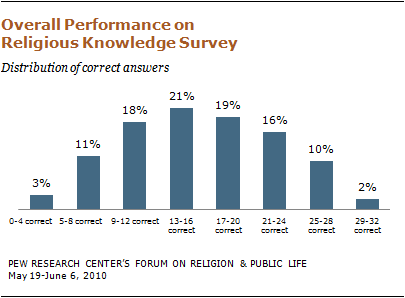
The scores on individual questions ranged from 8% to 89% correct. At the top end of that scale, at least eight-in-ten Americans know that teachers are not allowed to lead public school classes in prayer, that the term “atheist” refers to someone who does not believe in God, and that Mother Teresa was Catholic. At the other end of the spectrum, just 8% know that the 12th-century philosopher and Torah scholar Maimonides was Jewish, and 11% correctly identify Jonathan Edwards, viewed by many scholars as the pre-eminent American theologian, as a preacher during the First Great Awakening, a period of heightened religious fervor in the 1730s and ’40s.4
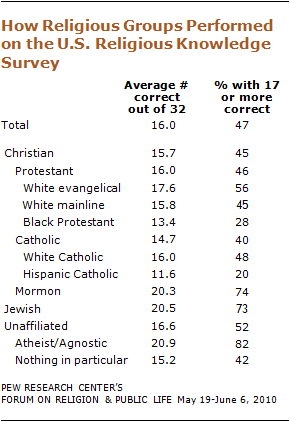
Overall, the three groups that perform best in this survey are atheists and agnostics (who get an average of 20.9 out of 32 questions right), Jews (20.5 questions right on average) and Mormons (20.3 questions right). Looked at another way, 27% of Jews, 22% of atheists and agnostics, and 20% of Mormons score in the top 10% of all respondents in overall number of correct answers to religious knowledge questions, getting at least 26 questions right. As will be discussed in detail later in this report, these groups display greater religious knowledge even when education and other factors are held constant. Mormons outperform Jews as well as atheists and agnostics on questions about the Bible but do not perform as well as the other two groups on questions having to do with world religions such as Islam, Hinduism and Buddhism.
White evangelical Protestants answer an average of 17.6 religious knowledge questions correctly. Though white evangelicals have lower scores than Jews and atheists/agnostics overall, they do significantly better on questions about the Bible. White evangelicals correctly answer an average of 5.1 out of seven Bible questions, compared with 4.4 among atheists and agnostics and 4.3 among Jews. Mormons answer almost six of the seven Bible questions correctly on average.
White mainline Protestants and white Catholics each closely resemble the public overall, getting about half of the 32 religious knowledge questions right on average (16 for white Catholics, 15.8 for white mainline Protestants). Those who describe their religion as “nothing in particular” answer an average of 15.2 questions correctly. Black Protestants answer an average of 13.4 questions correctly, and Hispanic Catholics get 11.6 right on average. Scores on this survey are higher among whites than among blacks or Hispanics even after controlling for other factors linked with religious knowledge, including education and religious affiliation.
The remainder of this section analyzes religious knowledge within the following subject areas:
The Bible: Five questions on the Old Testament and two on the New Testament.
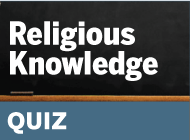
How much do you know about religion?And how do you compare with the average American? Take our short, 15-question quiz to find out. |
Elements of Christianity: The Bible items plus questions about Catholic teaching on the Eucharist, Protestant teaching about salvation through faith alone, Mother Teresa, Martin Luther and the First Great Awakening.
Elements of Judaism: The five Old Testament items plus questions about the Jewish Sabbath and Maimonides.
Elements of Mormonism: Three questions on the founding of the Church of Jesus Christ of Latter-day Saints and the Book of Mormon.
Knowledge of world religions: Items on the Jewish Sabbath and Maimonides (Judaism), Ramadan and the Koran (Islam), nirvana and the Dalai Lama (Buddhism), Vishnu and Shiva (Hinduism), Greek mythology (Zeus) and the religious composition of India, Pakistan and Indonesia.
Atheism and agnosticism: Definitions of each term.
Role of religion in public life: Questions on separation of church and state and constitutional restrictions on religion in public schools.
Knowledge of nonreligious topics: Nine questions on politics, science, history and literature.
Pew Forum Religious Knowledge Questions
Questions below have been paraphrased for brevity; most response options were rotated. See topline survey results (Appendix B) for exact wording and question order.
Bible What is the first book of the Bible? (Open-ended) What are the names of the first four books of the New Testament, that is, the four Gospels? (Open-ended) Where, according to the Bible, was Jesus born? Bethlehem, Jerusalem, Nazareth or Jericho? Which of these is NOT in the Ten Commandments? Do unto others…, no adultery, no stealing, keep Sabbath? Which figure is associated with remaining obedient to God despite suffering? Job, Elijah, Moses or Abraham? Which figure is associated with leading the exodus from Egypt? Moses, Job, Elijah or Abraham? Which figure is associated with willingness to sacrifice his son for God? Abraham, Job, Moses or Elijah?
Elements of Christianity What is Catholic teaching about bread and wine in Communion? They become body and blood, or are symbols? Which group traditionally teaches that salvation is through faith alone? Protestants, Catholics, both or neither? Was Mother Teresa Catholic, Jewish, Buddhist, Hindu or Mormon? What is the name of the person whose writings and actions inspired the Reformation? Luther, Aquinas or Wesley? Who was a preacher during the First Great Awakening? Jonathan Edwards, Charles Finney or Billy Graham?
Elements of Judaism When does the Jewish Sabbath begin? Friday, Saturday or Sunday? Was Maimonides Jewish, Catholic, Buddhist, Hindu or Mormon?
Elements of Mormonism When was the Mormon religion founded? After 1800, between 1200 and 1800, or before 1200 A.D.? The Book of Mormon tells of Jesus appearing to people in what area? The Americas, Middle East or Asia? Was Joseph Smith Mormon, Catholic, Jewish, Buddhist or Hindu?
World Religions Is Ramadan the Islamic holy month, the Hindu festival of lights or a Jewish day of atonement? Do you happen to know the name of the holy book of Islam? (Open-ended) Which religion aims at nirvana, the state of being free from suffering? Buddhism, Hinduism or Islam? Is the Dalai Lama Buddhist, Hindu, Jewish, Catholic or Mormon? In which religion are Vishnu and Shiva central figures? Hinduism, Islam or Taoism? What is the religion of most people in India? Hindu, Buddhist, Muslim or Christian? What is the religion of most people in Pakistan? Muslim, Hindu, Buddhist or Christian? What is the religion of most people in Indonesia? Muslim, Hindu, Buddhist or Christian? Who is the king of Gods in Greek mythology? Zeus, Mars or Apollo?
Atheism and Agnosticism Is an atheist someone who does NOT believe in God, believes in God, or is unsure whether God exists? Is an agnostic someone who is unsure whether God exists, does NOT believe in God, or believes in God?
Religion in Public Life What does Constitution say about religion? Separation of church and state, emphasize Christianity, or nothing? According to the Supreme Court, can a public school teacher lead a class in prayer? According to the Supreme Court, can a public school teacher read from the Bible as an example of literature? According to the Supreme Court, can a public school teacher offer a class comparing the world’s religions?
The Bible
The survey included seven questions about the Bible, tapping people’s knowledge on five topics from the Old Testament (the name of the first book of the Bible, the Ten Commandments and the identities of Abraham, Job and Moses) and two topics from the New Testament (the names of the four Gospels and the birthplace of Jesus).
Old Testament Questions
Nearly two-thirds of the public (63%) correctly name Genesis as the first book of the Bible when asked this question in an open-ended (not multiple-choice) format. More than eight-in-ten white evangelicals (85%), Mormons (85%) and black Protestants (83%) get this question right, as do roughly seven-in-ten atheists and agnostics (71%). By comparison, fewer than half of Catholics (42%), including 47% of white Catholics and 29% of Hispanic Catholics, are able to name Genesis as the first book of the Bible.
A slim majority of the public (55%) correctly says that the Golden Rule, “Do unto others as you would have them do unto you,” is not one of the Ten Commandments. More than eight-in-ten Mormons (81%) answer this question correctly, as do roughly two-thirds of white evangelicals (67%) and more than six-in-ten white Catholics (63%), atheists/agnostics (62%) and Jews (62%). By contrast, less than half of white mainline Protestants and black Protestants (49% each) get this question right.
Of the three Old Testament figures asked about in the survey, Americans are most familiar with Moses. Overall, more than seven-in-ten Americans (72%) know he was the biblical figure who led the exodus out of Egypt; 92% of Mormons and about as many Jews and atheists/agnostics answer this question correctly. Eight-in-ten white evangelicals correctly identify Moses, as do roughly three-quarters of black Protestants (73%) and about two-thirds of white mainline Protestants (68%) and Catholics (65%).
Compared with Moses, Abraham is less well-known, with 60% of all Americans correctly identifying him as the biblical figure who was willing to sacrifice his son’s life for God. Fewer (39%) identify Job as the biblical figure known for remaining obedient to God despite extraordinary suffering.
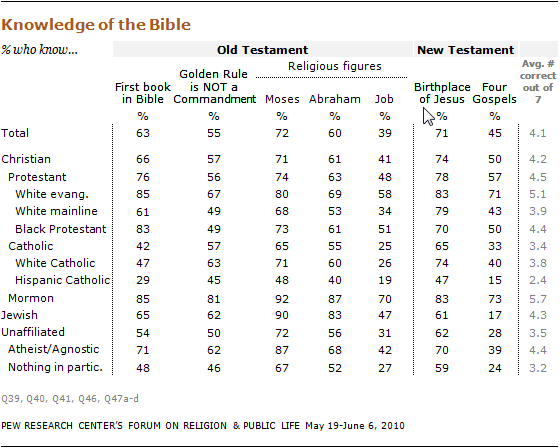
New Testament Questions
The New Testament questions inquired about the birthplace of Jesus and the names of the four Gospels. Most people (71%) know that, according to the Bible, Jesus was born in Bethlehem. This includes majorities of nearly every religious group, though less than half of Hispanic Catholics (47%) answer this question correctly.
Slightly less than half of those polled (45%) can name all four Gospels (Matthew, Mark, Luke and John). An additional 6% correctly name between one and three of the Gospels in this open-ended (not multiple-choice) question. Mormons and white evangelical Protestants do best (73% and 71%, respectively, correctly name all four Gospels). For Jews, this is among the toughest questions in the survey – just 17% are able to name all four Gospels. Roughly four-in-ten atheists/agnostics (39%) correctly name all four Gospels.
Overall Knowledge of the Bible
Overall, Mormons score best on these items, answering an average of 5.7 of the seven Bible questions correctly. White evangelical Protestants get about five of the seven Bible items right (5.1), while atheists and agnostics (4.4), black Protestants (4.4) and Jews (4.3) answer more than four of these questions correctly. (Jews, not surprisingly, know more about the Hebrew Scriptures, or Old Testament, than about the New Testament; 35% of Jews answer all five Old Testament questions correctly, while only 14% answer both New Testament questions correctly.) White mainline Protestants and Catholics answer an average of fewer than four Bible questions correctly (3.9 and 3.4, respectively). White Catholics score significantly higher than Latino Catholics on these items (3.8 correct on average among white Catholics vs. 2.4 correct among Latino Catholics).
Elements of Christianity
In addition to the Bible questions, the survey contained five items about elements of Christianity, including one question about the Catholic doctrine of transubstantiation (the belief that during Communion, the bread and wine become the body and blood of Jesus), one about the traditional Protestant teaching that salvation comes through faith alone, and three about major Christian figures (Mother Teresa, Martin Luther and Jonathan Edwards).
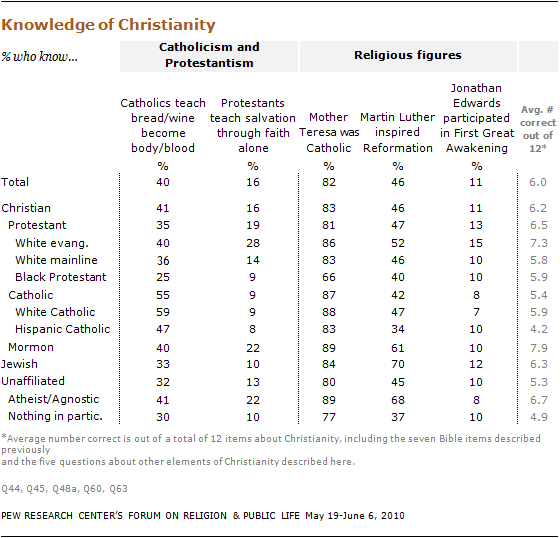
About half of those polled (52%) say, incorrectly, that Catholicism teaches that the bread and wine used for Communion are symbols of the body and blood of Jesus. Just four-in-ten people correctly answer that, according to the Catholic Church, the bread and wine actually become the body and blood of Jesus. Even many Catholics are unaware of their church’s teaching on this topic; while 55% of Catholics get the question right, more than four-in-ten Catholics (41%) say the church teaches that the bread and wine are symbols of Christ’s body and blood, and 3% say they do not know what the church’s teaching is. Still, Catholics perform better on this question than does any other religious group.5
Fewer than one-in-five people (16%) correctly identify Protestantism as the faith that traditionally teaches that salvation comes through faith alone. Most people get this question wrong: 9% say this teaching is traditionally associated with Catholicism, 38% say it is traditionally associated with both Protestantism and Catholicism, 10% say it is not normally associated with either faith and more than a quarter (27%) say they do not know the answer. White evangelicals (28% correct), Mormons (22%) and atheists/agnostics (22%) perform better than other groups on this question. However, even among these groups, many more people get the answer wrong than get it right.6
The survey finds great variation in awareness of three prominent figures in Christianity. Eight-in-ten Americans (82%) know that Mother Teresa (1910-1997) was Catholic, including nearly nine-in-ten Catholics, who do better on this question than on any other religious knowledge question except prayer in public schools.
Just 46% of those polled correctly identify Martin Luther (1483-1546) as the person whose writings and actions inspired the Protestant reformation. Familiarity with Martin Luther is highest among Jews (70%), atheists/agnostics (68%) and Mormons (61%). About half of all Protestants (47%) answer this question correctly.
Finally, there is little public awareness of Jonathan Edwards (1703-1758), viewed by many scholars as the greatest theologian in American history. Only about one-in-ten people surveyed (11%) are able to identify him as a preacher during the First Great Awakening of the Colonial era. Nearly three-in-ten people (28%) incorrectly name Billy Graham as a preacher who was active during the First Great Awakening, 10% incorrectly name Charles Finney, and fully half of those polled say they do not know which of these three men was active during the First Great Awakening.
Combining these five items on elements of Christianity with the seven questions about the Bible into a single scale makes it possible to compare religious groups’ overall knowledge of Christianity. Mormons score best on this scale, getting an average of 7.9 of the 12 questions about Christianity right. They are followed by white evangelical Protestants, who average 7.3 questions right. Atheists/agnostics (6.7) and Jews (6.3) get more than six of the 12 questions about Christianity right. Black Protestants (5.9), white Catholics (5.9) and white mainline Protestants (5.8) get roughly half of the questions about Christianity correct. Those who say their religion is “nothing in particular” (4.9) and Hispanic Catholics (4.2) answer fewer than five of these 12 questions correctly.
Elements of Judaism
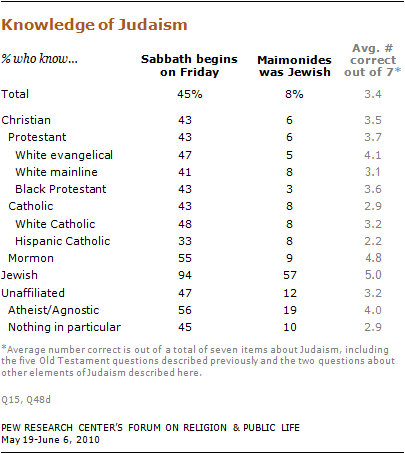
In addition to the five items about the Old Testament, the survey included two other questions about elements of Judaism – the Sabbath and the identity of Maimonides. Overall, 45% of those polled correctly identify Friday as the day on which the Jewish Sabbath begins. Three-in-ten say the Jewish Sabbath begins on Saturday, which actually is the day it ends, while 7% select Sunday, and the rest say they do not know when the Jewish Sabbath begins. Among Jews, 94% get this question right. Most atheists/ agnostics (56%) and Mormons (55%) in the survey also answer this question correctly, while most people in other religious groups do not know when the Jewish Sabbath begins.
Fewer than one-in-ten adults (8%) know that Maimonides was Jewish. Jews answer this question correctly at much higher rates than the general public, with 57% getting it right. But there is considerable confusion about Maimonides’ identity even among Jews, with 13% selecting an incorrect answer to the question and 30% saying they do not know. One-in-five atheists/agnostics (19%) know Maimonides was Jewish; no more than one-in-ten people in any other religious group get this question right.
Jews on average correctly answer five of the seven questions pertaining to Judaism (the five Old Testament questions discussed previously and the two questions discussed here). Mormons also do well on these questions (4.8 correct on average), though many more Jews than Mormons get all seven questions right (29% among Jews, 6% among Mormons). White evangelical Protestants and atheists/agnostics each answer about four of these questions correctly. Black Protestants get slightly more than half of these items right on average (3.6), putting them ahead of white Catholics (3.2) and white mainline Protestants (3.1).
Elements of Mormonism
The survey included three questions about Mormonism. Overall, 51% of Americans identify Joseph Smith, founder of the Latter-day Saints, as a Mormon, and 44% know that Mormonism was founded after 1800. Four-in-ten know that according to the Book of Mormon, Jesus appeared to followers in the Americas.
Mormons clearly know more about their own faith than others do about Mormonism. On average, Mormons get 2.7 of the three questions right, with eight-in-ten Mormons (81%) answering all three questions correctly. Atheists/agnostics (2.1) and Jews (1.9) each get an average of roughly two of these questions right, with members of other religious groups exhibiting significantly lower levels of knowledge about Mormonism.
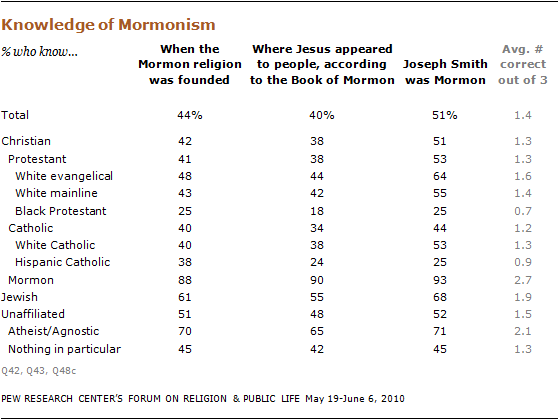
World Religions
The survey included 11 questions about world religions other than Christianity. These consisted of the questions about the Jewish Sabbath and Maimonides described previously, as well as two questions about Islam (about Ramadan and the Koran), two questions about Buddhism (about nirvana and the Dalai Lama), one question about Hinduism (recognition of Vishnu and Shiva as Hindu deities), one question about ancient Greek mythology, and three questions about the religious make-up of large, geopolitically important countries (India, Pakistan and Indonesia).
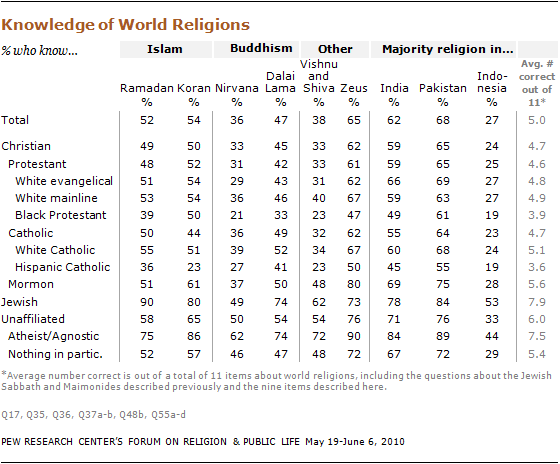
Among all Americans, 54% correctly name the Koran as the holy book of Islam, and 52% know that Ramadan is the Islamic holy month. Knowledge of these elements of Islam is highest among Jews (77% get both of these questions right) and atheists/agnostics (69% get both right). The survey did not include enough interviews with Muslim respondents to permit reliable analysis of their religious knowledge.
About half of those polled (47%) correctly identify the Dalai Lama’s religion as Buddhism. This includes roughly three-quarters of atheists/agnostics (74%) and Jews (74%) who know the Dalai Lama’s faith. Fewer people (36%) identify Buddhism as the religion that aims at nirvana, the state of being free from suffering. A similar proportion (38%) correctly name Hinduism as the faith with which the deities Vishnu and Shiva are associated. As is the case with Muslims, however, the survey did not include enough interviews with Buddhist or Hindu respondents to permit reliable analysis of their religious knowledge.
About two-thirds of Americans (68%) know that most people in Pakistan consider themselves to be Muslim, while 62% know that most people in India consider themselves to be Hindu. Far fewer (27%) are aware that most Indonesians are Muslim.
In total, Jews and atheists/agnostics do far better on these questions about elements of world religions than do members of any other group. On average, Jews answer 7.9 of these 11 questions correctly, while atheists and agnostics answer 7.5 correctly. Mormons also score better than the public overall, getting 5.6 questions right, and those whose religion is nothing in particular get 5.4 right on average. White Catholics, white evang-elicals and white mainline Protestants all get about five of these questions right on average, while black Protestants and Hispanic Catholics each get slightly fewer than four of these items correct.
Atheism and Agnosticism
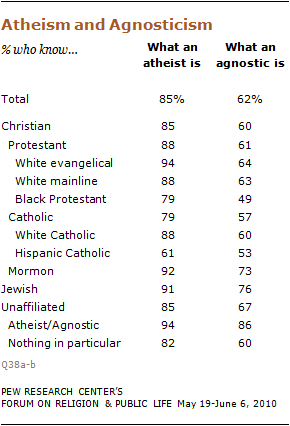
Among the public as a whole, 85% know that an atheist is someone who does not believe in God. This includes 94% of self-described atheists and agnostics as well as similarly large numbers of white evangelical Protestants (94%). Roughly nine-in-ten Mormons (92%), Jews (91%), white mainline Protestants and white Catholics (88% each) also know what the term “atheist” means. Roughly eight-in-ten black Protestants (79%) are able to define the term “atheist.” Among Hispanic Catholics, about six-in-ten (61%) get this question right.
Fewer people know the definition of an agnostic than the definition of an atheist. Overall, 62% correctly say that an agnostic is someone who is unsure whether God exists; 12% incorrectly say an agnostic is someone who does not believe in God, 5% say an agnostic is someone who does believe in God and 22% volunteer that they do not know the answer. Among atheists and agnostics, 86% get this question right, as do roughly three-in-four Jews (76%) and Mormons (73%). About six-in-ten white evangelical Protestants (64%), white mainline Protestants (63%), white Catholics (60%) and those whose religion is nothing in particular (60%) know what an agnostic is, as do about half of Hispanic Catholics (53%) and black Protestants (49%).
In total, about six-in-ten people (58%) get both of these questions right.
The Role of Religion in Public Life
Across the board, majorities of those surveyed – including seven-in-ten people in many religious groups – know that the Constitution says the government shall neither establish an official religion nor interfere with the free exercise of religion. But the survey also shows that large numbers think the Constitution, as interpreted in Supreme Court rulings in recent decades, places tighter reins on religious education in public schools than it actually does.
Nearly nine-in-ten people (89%) correctly say that Supreme Court rulings prohibit public school teachers from leading a class in prayer. At least eight-in-ten members of all religious groups correctly answer this question. But two-thirds of those polled (67%) also think that public school teachers are prohibited from reading from the Bible as an example of literature. Only 23% correctly say that reading from the Bible as an example of literature is permitted. More than half of those surveyed (51%) say that public school teachers are prohibited from offering a class comparing the world’s religions, while 36% know that offering courses in comparative religion is permitted.
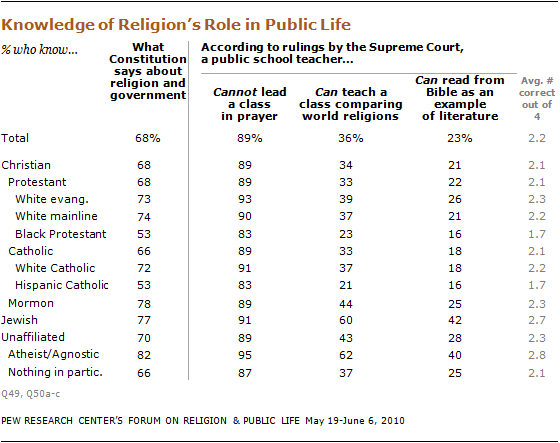
Atheists/agnostics and Jews perform better than other groups on questions related to the role of religion in public life. On average, atheists and agnostics get 2.8 of these four questions right, and Jews get 2.7 right. Mormons and white evangelicals average 2.3 correct answers and white mainline Protestants and white Catholics 2.2 each. Black Protestants and Hispanic Catholics give an average of fewer than two correct answers (1.7 for each group) to the survey’s four questions about religion in public life.
Nonreligious Knowledge
For comparison purposes, the survey also included nine questions about knowledge of topics other than religion. These consisted of two questions about politics (the name of the vice president of the United States and which political party currently holds a majority in the U.S. House of Representatives), three questions about science (one each about antibiotics, lasers and Charles Darwin) and four questions about historical or literary topics (Susan B. Anthony, the New Deal, Herman Melville and the Scopes trial). Overall, 60% of those surveyed get more than half of the general knowledge questions right, compared with 52% who get half or more of the religion questions right. This does not mean, however, that Americans have greater general knowledge than religious knowledge; it could simply be that the general knowledge questions on the survey are easier than the religious knowledge questions.
In the political domain, roughly seven-in-ten people (72%) know that Democrats currently have a majority in the House of Representatives. Six-in-ten (59%) correctly name Joe Biden as the vice president in an open-ended (not multiple-choice) question. More people (69%) were able to identify Dick Cheney as the vice president in a 2007 Pew Research Center survey, but at the time Cheney had been in office six years, compared with about a year and a half for Biden when this survey was conducted.
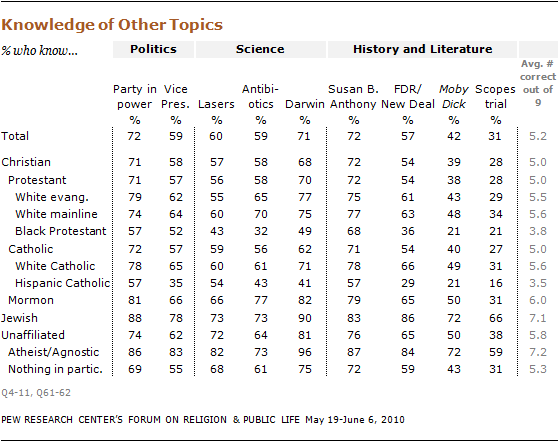
All three scientific knowledge questions were answered correctly by large majorities of those polled. Seven-in-ten (71%) know that Charles Darwin (not Sigmund Freud or Clarence Darrow) developed the theory of evolution by natural selection. In true-or-false questions, 60% correctly say it is false that lasers work by focusing sound waves, and 59% know it is false that antibiotics will kill viruses as well as bacteria.
Nearly three-quarters of Americans (72%) identify Susan B. Anthony as a leader of the women’s suffrage movement (and not the abolitionist or prohibitionist movements). And nearly six-in-ten (57%) correctly name the New Deal (not the Square Deal or the Great Society) as the series of government programs passed while Franklin D. Roosevelt was president. Fewer people are able to identify the author of the novel Moby Dick (42% know it is Herman Melville, while 18% think it is Nathaniel Hawthorne, 4% say Stephen King, 2% say Edith Wharton and 33% say they do not know). And only about one-third of those polled know which famous court trial dealt with whether evolution could be taught in public schools; 31% know this was the Scopes trial, while 36% say it was Brown vs. Board of Education and 3% name the Salem witch trials.
Atheists/agnostics (7.2 out of nine correct on average) and Jews (7.1) perform best on these general knowledge items. Mormons answer six of these questions correctly on average. White Catholics and white mainline Protestants each give an average of 5.6 correct answers to these questions, while white evangelicals get 5.5 correct and those whose religion is nothing in particular answer 5.3 correctly. Black Protestants (3.8) and Hispanic Catholics (3.5) each get fewer than four of these nine questions right on average.
Overall, those who perform well on the religious knowledge questions also score well on the general knowledge questions, while those who score poorly on religious knowledge questions also answer relatively few general knowledge questions correctly. Most people either get more than half of the questions in both domains of knowledge right (41%), or less than half in both domains right (35%). About one-in-five people (19%) answer more than half of the general knowledge questions correctly while answering less than half of the religious knowledge questions accurately, while only 6% get most religious knowledge questions right and most general knowledge questions wrong.
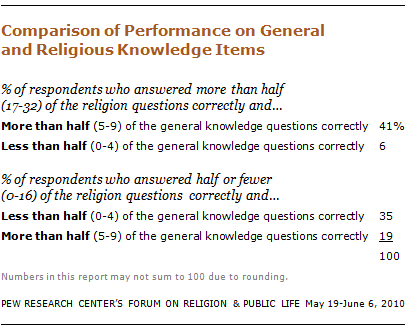
Footnotes
[Edwards]
5 The centrality of this teaching was emphasized by Pope John Paul II in his 2003 encyclical, Ecclesia de Eucharistia, which cited “the perennially valid teaching of the Council of Trent: ‘the consecration of the bread and wine effects the change of the whole substance of the bread into the substance of the body of Christ our Lord, and of the whole substance of the wine into the substance of his blood. And the holy Catholic Church has fittingly and properly called this change transubstantiation.’ ” http://www.vatican.va/edocs/ENG0821/_P3.HTM (ch. 1, section 15). (return to text) 6 This doctrine, known by the Latin phrase sola fide (by faith alone), is one of the key theological differences between most Protestant denominations and the Catholic or Eastern Orthodox Churches. It is summed up in Article IV of the 1530 Augsburg Confession, which states that “men cannot be justified before God by their own strength, merits, or works, but are freely justified for Christ’s sake, through faith…” http://bookofconcord.org/augsburgconfession.php. (return to text)
Photo credit: Eric Swanson/Corbis




